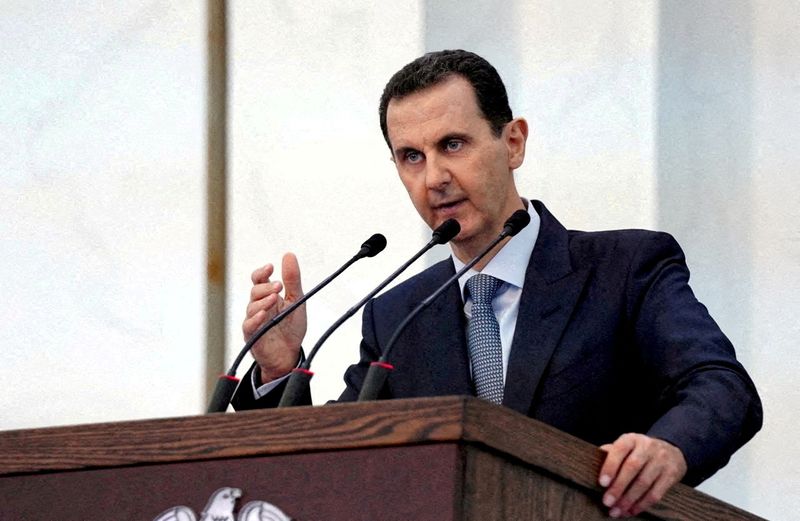Syria’s Assad to steal spotlight at Arab summit after years in the cold
2023.05.17 10:07

© Reuters. FILE PHOTO: FILE PHOTO: Syrian President Bashar al-Assad addresses new members of parliament in Damascus, Syria, in this handout released by SANA on August 12, 2020. SANA/Handout via REUTERS
By Aziz El Yaakoubi
RIYADH(Reuters) – Syrian President Bashar al-Assad, a pariah for more than a decade, is expected to steal the spotlight at Friday’s Arab League summit in Saudi Arabia, where he will rub shoulders with regional leaders who once backed his war foes.
Ostracised by most Arab states following his crackdown on protests against his rule in 2011 and the ensuing civil war, his government’s return to the bloc is a signal that his war-battered country’s isolation is ending.
Saudi Arabia, Qatar and others for years supported anti-Assad rebels. But Syria’s army, backed by Iran, Russia and paramilitary groups, has regained control of most of the country.
While Arab countries appear to have brought Assad in from the cold, they are still demanding that he curbs Syria’s flourishing drugs trade and that war refugees can return.
But it remains a striking recovery in the Syrian leader’s fortunes.
“This is, indeed, a triumphant moment for Bashar al-Assad, being accepted back into the Arab League, the Arab world, after being shunned and isolated by it for over a decade,” said David Lesch, a Middle East History professor at Trinity University in Texas.
Several states, including Qatar and Kuwait, had voiced their opposition to welcoming back Assad. But the summit will underscore how Qatar has scaled back its ambitions to be a major diplomatic player in the region and accept Saudi’s preeminent role.
Assad is not the only divisive issue among Arabs. The League is also split over questions ranging from normalisation with Israel and how to support the Palestinian cause, the regional roles of Turkey and Iran, and which side to pick in polarised global politics.
Also present in the Red Sea city of Jeddah are envoys for Sudan’s warring military factions. That ongoing conflict is expected to dominate discussions. Saudi Arabia has been hosting talks on a ceasefire and humanitarian issues in Sudan for weeks.
WORK TOGETHER
The kingdom wants to send a message to the global community that Arabs will work together, said Abdullah Baaboud, the State of Qatar Chair for Islamic Area Studies at Waseda University in Tokyo.
“That also helps it (Riyadh) not only in term of its status within the Middle East but also beyond that when it comes to dealing with international powers, whether it is the United States, Europe or China,” Baaboud said.
Washington has been sceptical about Assad’s return to the Arab fold. A bipartisan group of U.S. lawmakers introduced a bill last week intended to bar U.S. recognition of Assad as Syria’s president and enhance Washington’s ability to impose sanctions.
His return to the Arab League is likely to revive questions over his human rights record.
Government forces have used chemical weapons more than two dozen times during Syria’s civil war, U.N. war crimes investigators said. Syria has repeatedly denied using chemical weapons.
But Assad has proven resilient despite pressure from Western powers and Arab countries who backed his enemies in the war.
The Syrian crisis and other regional conflicts including Yemen and Libya, pose further challenges for the Arab League, which is often undermined by internal divisions. Arab leaders argue that security is more important than democracy.
“There has been indeed in the past few years a willingness by Saudi Arabia and other regional actors to consolidate a form of authoritarian stability in the region,” said Joseph Daher, a professor at the European University Institute in Florence, Italy.
“Despite continuous rivalries among various states…they hold a common position in wanting to return to a situation similar to that in place before the uprisings in 2011.”
This year’s summit also comes as Egypt, Tunisia and Lebanon struggle with runaway inflation, unemployment and popular anger.
Saudi Arabia and the United Arab Emirates, however, have set a new tone for times of crisis, saying the era of no-strings attached to help that the Gulf states offer others is over.








